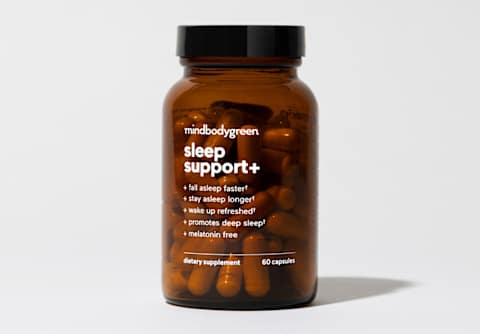5 Ways Poor Sleep Messes With Your Metabolism & How To Fix It
If you can't lose stubborn belly fat, time to look at your sleeping patterns.


Registered Dietitian Nutritionist
Registered Dietitian Nutritionist
Molly Knudsen, M.S., RDN is a Registered Dietician Nutritionist with a bachelor’s degree in nutrition from Texas Christian University and a master’s in nutrition interventions, communication, and behavior change from Tufts University. She lives in Newport Beach, California, and enjoys connecting people to the food they eat and how it influences health and wellbeing.
Image by Andisheh A / Unsplash February 20, 2025 Sleeping well is the cornerstone of good health. You think better and your mood and energy are elevated after a good night's rest. But things go haywire pretty quickly when you're not getting enough sleep—including your metabolic health. Here are five ways sleeping poorly impacts your metabolism and what you can do to get your sleep—and your health—back on track: 1. When sleep is compromised (even if it's just a night), it appears to make your cells less sensitive to insulin5. Insulin is the hormone that helps move blood sugar (glucose) out of the bloodstream and into cells for energy or to the liver to be stored for later. When cells don't respond—or become resistant6—to insulin, glucose levels remain elevated in the blood longer than they should be. So, say you always eat an apple in the morning. A bad night's rest could cause this food to spike your blood sugar, whereas you may have a more even-keel rise and fall in glucose levels after sleeping well. Over time this impaired blood sugar control may lead to consistently elevated blood glucose—a risk factor for diabetes. But short sleep duration on its own is also a risk factor for diabetes. Researchers of a study published in Diabetes Medicine found that the odds of prediabetes7 among over 2,000 healthy adults doubled for those who reported sleeping five or fewer hours a night compared to those who slept around seven hours a night. Another study that pooled data from over one million individuals found that those sleeping five or fewer hours were 48% more likely8 to develop diabetes. 2. Not sleeping well directly messes with your hunger hormones: leptin and ghrelin. Specifically, inadequate sleep decreases leptin9, the hormone that signals to the brain that you're full. At the same time, ghrelin levels (the hormone that stimulates hunger) increase. This can prompt an increase in appetite and cravings that make maintaining a healthy weight more challenging. Studies show that people who sleep less are heavier snackers10 and opt for high-calorie foods, for example. They also eat less protein and fiber11 (two nutrients essential for metabolic health and satiety) than those who sleep seven to eight hours a night. Sufficient sleep is needed to help regulate these hunger hormones and make it easier to select healthful foods. 3. Sleep and stress share similar pathways in the body12. Not only can sleeping poorly stress you out, but stress can make it challenging to fall asleep and stay asleep. It's a vicious cycle that's disruptive to your health. Let's dig into why this happens: Cortisol is a hormone that's released when you're under stress. Under short bursts of stress, the hormone helps you feel alert and energized—but, like sleep, it follows a circadian rhythm. Cortisol levels naturally peak in the morning12 (to help get you out of bed) and drop to their lowest levels at night (right as melatonin levels increase to induce sleepiness). 4. As these hormones tell the body to hold on to fat, soft tissues (like muscles) become a more appealing energy source. So fat mass increases, and lean muscle mass decreases, which slows your metabolism. 5. Exercise benefits your metabolic health15 in so many ways. It helps with blood sugar control and insulin sensitivity, increases your daily energy expenditure, builds lean muscle mass, improves blood pressure, and the list goes on. But if you're tired, exerting yourself physically may not sound enticing. Research shows that fatigued adults get less moderate to vigorous physical activity, take fewer steps16, and engage in more sedentary behaviors (like napping, lounging, or resting). While there are many reasons you may feel fatigued, sleep could very well be a contributing factor. 
It increases your blood sugar
It ramps up your appetite
It can stress your body out
It can change your body composition
It lowers your energy to exercise
How much sleep do you need?
Numerous long-term studies show that short sleep duration—often considered five to six hours a night or less—is linked to worsened metabolic health, longevity18, and gut health19. Sleeping too much20 can impact health in similar ways.
That said, everyone's ideal sleep range is different. Some people may feel rested after six to seven hours of sleep, whereas others require eight or nine (maybe even more) on a more regular basis. And women often need slightly more sleep than men21.
So it's important to learn (and respect) how much sleep you need each night to feel your best.
If you're not currently getting the rest you need, not to worry: There are plenty of ways to improve your sleep quality each night—starting with the following tips.
Tips to improve your sleep & metabolism
About 88% of U.S. adults are metabolically unhealthy, and 33%22 do not get the recommended seven to nine hours of sleep each night. So most of us have room for improvement.
These are our top tips for improving your sleep and, therefore, your metabolic health:
The takeaway
If you have trouble losing weight, snacking too much, craving sugary foods, or stressing all the time, you should definitely take stock of how much you're sleeping and the quality of that sleep. Sleeping better will not only help improve your metabolic health, but improving your metabolic health will also help you sleep better.
Taking steps to improve both areas of health can have a profound ripple effect on your overall well-being.

 Fransebas
Fransebas 

































